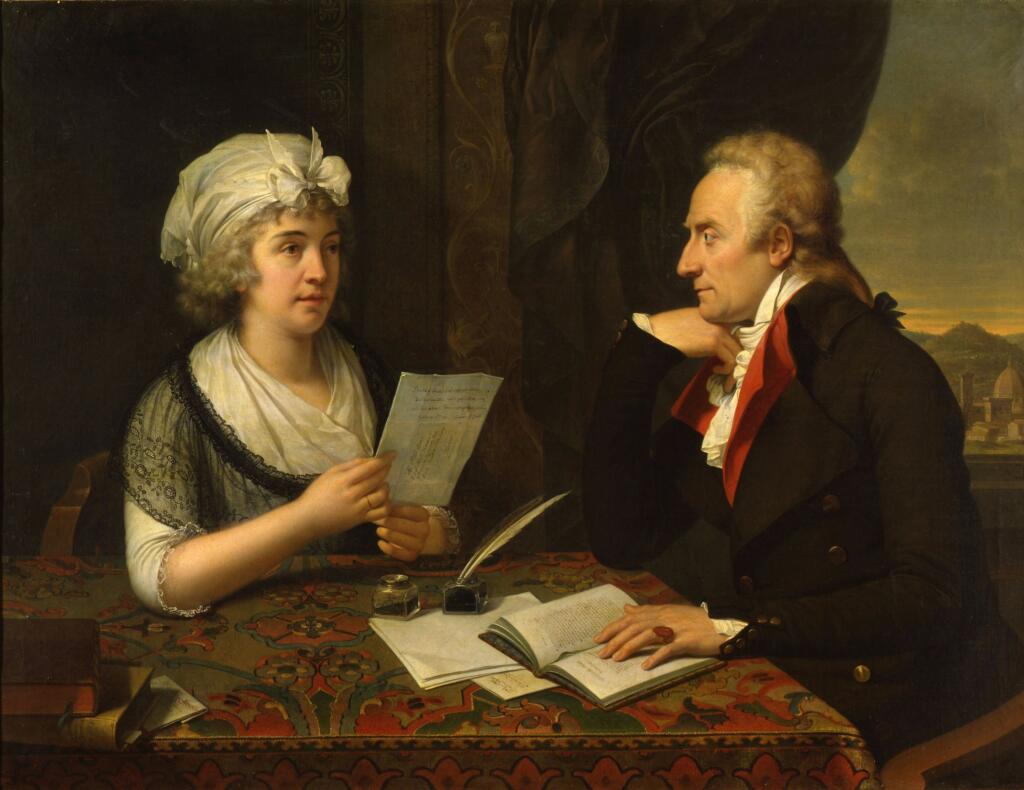
Vittorio Alfieri, from a noble family, was born in Asti on 16 January 1749. In order to embark on a military career, he enrolled at the Royal Academy of Turin, which he left in 1766 with the rank of ensign. Afterwards, he began travelling around Europe. On his return to Italy, after a short stay in Rome, he decided to follow Luisa Stolberg, Countess of Albany, to France. Disturbed by the French revolutionary climate, he returned to Italy and settled in Florence, where he died in 1803. Vittorio Alfieri is one of the most famous tragic poets of the 18th century. A life divided between travel, amorous adventures and continuous struggles against tyrannical ideologies made the man of letters one of the forerunners of the restlessness that distinguished the souls of Romanticism.
Defined by Vincenzo Monti as a “smith of uncultivated / shaggy charms”, he was echoed by Giuseppe Parini who in a sonnet asks why “dell’estro ai generosi passi/ fan ceppo i carmi?” August W. Schlegel completely drowns Vittorio Alfieri, calling him, without panegyrics, an “impoetic author, very bad at versification”. In short, it cannot be said that he was much acclaimed by his colleagues. For a long time Alfieri’s tragedies and style remained indigestible to critics, on the other hand, how can one blame his friends and rivals, contemporary and otherwise? It was an arduous task to bring to the light of day the poetic genius concealed in his dry, disharmonious verses.

Curiosities about the poet’s life: childhood and adolescence
Where does the passionate and restless character originate? Without bothering Freud, like everyone else, Vittorio Alfieri was a child and adolescent, but in what family context did he develop his personality? Quite questionable and bizarre were the educational methods adopted by the adults of reference, it is said that one of the punishments to which little Vittorio was subjected was to have to go to mass with a net over his head every time he did one of his own; rather than expiate the imprudence committed, he was subjected to public pillory. No wonder he had developed a ‘melancholic humour’ as he put it in his work ‘Life’, an affliction that led him at the age of seven to attempt suicide. Foolishly, he thought of imitating the sage Socrates, even though the philosopher’s knowledge had probably not yet entered his noggin. One morning he got up with the intention of gorging himself on hemlock, or at least what he thought was hemlock. Lucky for the young man, only harmless herbs grew in the garden he had gone to, the ingestion of which gave the inexperienced child banal intestinal symptoms.
Vittorio Alfieri is also known for his motto ‘Volli, e volli sempre, e fortissimamente volli’ (I willed, and always willed, and most strongly willed). There are various theories that try to give a plausible explanation to the aphorism: according to some, Alfieri would have written it to testify to his decision to be chained to the chair by his servant in order to force himself to write and become an author of tragedies; according to others, the motto conceals the poet’s inner struggle to repress a deep feeling he had for a woman.
The works: The Rhymes
Le Rime is a work consisting of approximately three hundred poems, a sort of poetic diary written throughout his life. The sonnet form of Petrarchan inspiration prevails, although epigrams, songs and odes are also present. The book constitutes a valid testimony of the poet’s thought and state of mind, with an autobiographical imprint, as all the rhymes bear footnotes indicating the date, place and situation in which they were composed. Several themes are addressed in the work: the feeling of loneliness, love for the Countess of Albany, the reason/feeling contrast, poetic pain and reflection on being a poet, passion for politics. A concentration of life expressed through a style with a repeatedly interrupted rhythm, dryly and briefly broken sentences, often dissonant juxtapositions, a language that is not very harmonious and musical. All this, however, makes Vittorio Alfieri the poet who knew how to give a tragic depiction of feelings.
*Translated with Translator
Translated with www.DeepL.com/Translator (free version)
